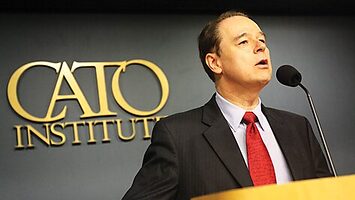The Best of David Boaz
Some highlights from the career of a modern champion of liberty.

In a tenure spanning five decades, David Boaz played a key role in shepherding the Cato Institute with a dedication to libertarian principle and a belief in the power of ideas to improve the prospects for liberty and human flourishing. Joining Cato in 1981, around the time it relocated from San Francisco to Washington, D.C., Boaz brought his knowledge of the libertarian intellectual tradition and his considerable rhetorical powers to all his work, making a critical contribution to the Institute’s success.
Like many Cato projects, Libertarianism.org owes a lot to David Boaz. He was an advocate for the project from its inception, and a voice that called us to uphold high standards of intellectual—and, we remember fondly, typographical—rigor.
What follows is a small selection of Boaz’s work over the years.
Free Thoughts Episode 10: “What Is Libertarianism?”
With his characteristic clarity and charm, Boaz outlines his understanding of libertarianism, and answers common objections.
Introduction to Libertarianism Lecture Series
Libertarianism.org has several collections of introductory lectures (with companion books) on topics like political philosophy, statistics, and economics, taught by a variety of experts. But where to find an interdisciplinary expert who understands the rich and varied aspects of libertarianism as a whole? For that, we turned to David Boaz. Boaz’s series of fourteen short lectures, beginning with the one linked above, provide a comprehensive overview of libertarian thought.
Boaz was, for many years, the editor of Cato Policy Report, writing a signed editorial column in each issue. In this piece Boaz offers an overview of communitarian and conservative understandings of the relationship between rights and responsibilities, contrasting each with a libertarian perspective. He defends libertarianism from the charge of ignoring or rejecting moral responsibilities.
History was an important source of insight for Boaz, especially the legacy of the American Founding. In this piece, another Cato Policy Report editorial, he explains how and why history should inform our judgments about the present and the future. He explains also that our judgment of important historical movements and figures should be informed by our understanding of libertarian principle. “The truly great men,” Boaz writes, “are the ones who have fought for liberty.”
It is clear to all those who knew him that he lived his life with that conviction.